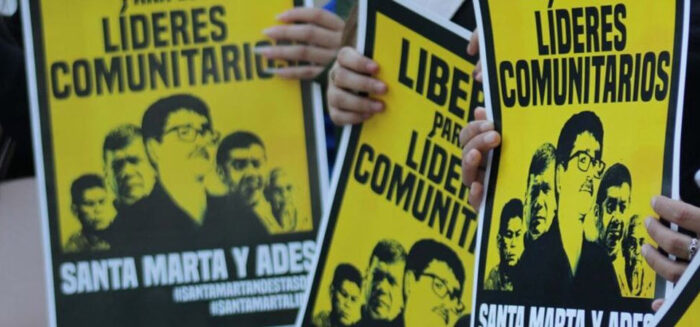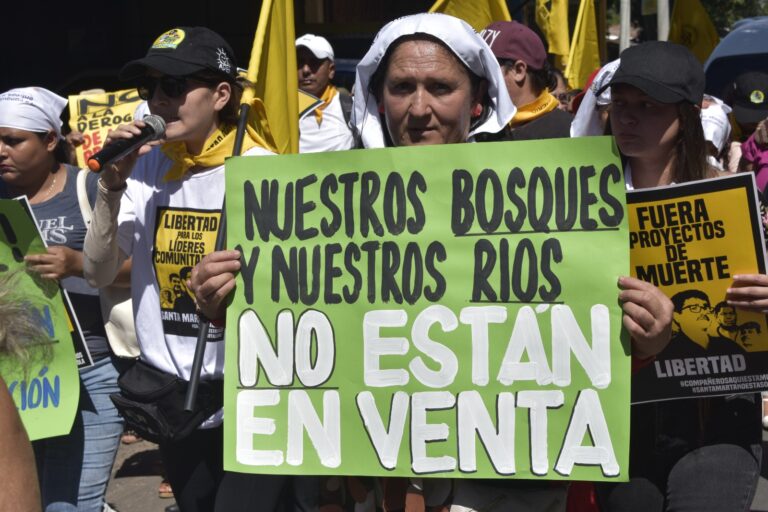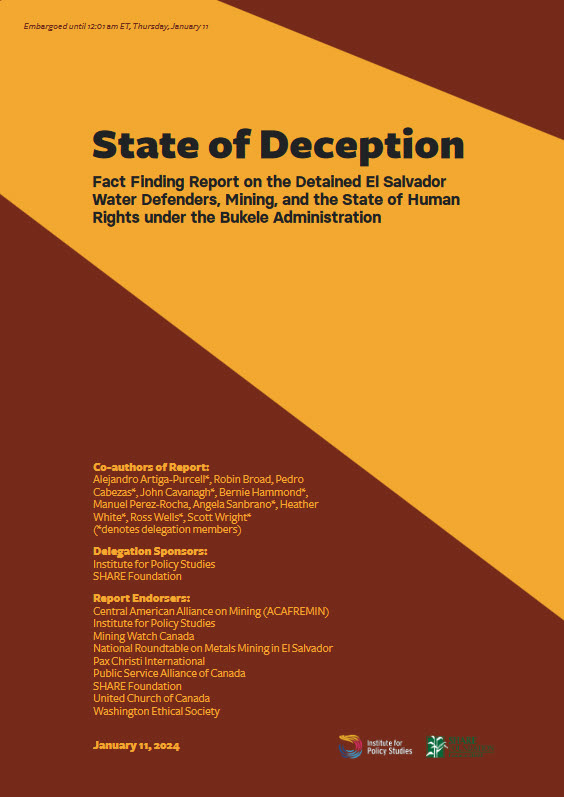In October 2023 a US-Canadian delegation visited El Salvador and met with leaders of civil society and human rights groups, lawyers, economists, a member of the legislature, and others.
‘We were shocked,’ they say, ‘at the level of fear, suffering, and corruption in the country amid Bukele’s “state of exception.” Our interviews in El Salvador indicate that the country is now a police state. With elections just a month out, the government of El Salvador has moved systematically in the direction of becoming a dictatorship — with the arbitrary arrest and imprisonment of the Santa Marta Five only the tip of the iceberg.’
The arrest of the five water defenders in January 2023 was previously described in detail by LAB and the Institute for Policy Studies. The five had played leading roles in the campaign for a ban on metal mining in El Salvador and there has been sustained pressure by mining companies to re-open gold mines near the Lempa River in Cabañas.
The delegation’s key findings are:
- Among the over 70,000 people that Salvadoran President Nayib Bukele has incarcerated under abysmal conditions and the use of torture are tens of thousands of innocent people, including five water defenders and numerous labor leaders. No evidence has been presented by the government to back the arrest of the five water defenders, and charges against them should be dropped under a 1992 amnesty.
- There is compelling evidence that President Bukele desires to violate a unanimous 2017 vote in the Salvadoran legislature to prohibit mining, a move that would endanger the country’s water supply and violate the public will.
- President Bukele has taken a series of steps to reduce the independence of the judiciary, to violate basic human rights, and to suspend civil liberties and the rule of law in the name of protecting the population from the violence caused by gangs. He is starving city governments of finances while expanding the military and is diverting millions of dollars borrowed from abroad for his cronies.
- Representatives of the executive branches of the governments of the United States, Canada, Mexico, and the European Union have chosen to ignore these massive violations of human rights as they drop their criticism of Bukele’s actions and supply financial aid to his government.
The report explores the rise to power of Nayib Bukele, the current president of the country. It traces the political manoeuvres that has left him with near absolute power in the country and enabled him in March 2022 to enact a ‘state of exception’ in the country. This decree, which has been renewed monthly and is still in effect, gives Bukele a free hand to arbitrarily suspend democratic and fundamental rights and to arrest and confine people without legal representation indefinitely. It has resulted in the imprisonment of an additional estimated 70,000 people, many of whom may be innocent but have not been afforded the opportunity to defend themselves.
Bukele is intending to reintroduce mining in El Salvador, the delegation concludes, in part to address huge financial losses incurred due to his ill-fated decision make Bitcoin one of the country’s official currencies just as it was about to suffer a dramatic drop in value. The arrest of the water defenders and the attempt to brand them as murderers appears in part an attempt to diminish the work that they have done to bring about the ban on mining in the country, and to help facilitate a return to mining. It also acts as a warning that opposition to mining and anything else that Bukele proposes will not be tolerated.

Several organizations told the delegation that there are strong signs that the Bukele regime wants to restart mining. One source reported a meeting in 2020 when Bukele asked about prospects of restarting mining. Others suggested that the current secret negotiations of a free trade agreement between El Salvador and China includes the possibility of investment in the mining sector.
In 2021, the Ministry of the Economy included in its strategic goals, the regulation of mining. The Bukele government has joined the Intergovernmental Forum on Mining funded by the Canadian government and requested that it conduct an evaluation of the mining sector in the country. Bukele has also passed a new law to create a new Directorate of Hydrocarbons, Energy and Mines that includes metallic mining, despite this being prohibited in the 2017 prohibition against mining.
A police state
The report finds that Bukele’s popularity in El Salvador is a result of the relief felt by many Salvadorans that the gang activity that menaced the population for the past 20 to 30 years appears to have been curtailed, at least for the time being. It would be a mistake to underestimate the strength of this feeling of relief in many Salvadorans whose lives had long been constrained by so much fear and anxiety due to the violence and threats posed by gang activity in the country.
One can appreciate the sense of freedom to move about the streets without worrying about being caught up in the activity of competing gang members defending their territory or that they might be murdered or that their children might be recruited to gang activity.
Similarly, businesses for the first time in a long time could now operate without being required to pay ‘taxes’ or face violence or death by the gangs.
In spite of this relief and the sense of gratitude to Bukele on the part of many, a number of people — particularly those who themselves or members of their family have been the victims of Bukele’s arrests and intimidation — are beginning to apprehend the costs in terms of democratic liberties.
The victims’ complaints are echoed by human rights organizations and social leaders who denounce the lack of a real public security policy and the failure to attack the structural causes of violence.
In addition to the military and police, Bukele controls both the legislature and the judiciary and his continuing ‘state of exception’ gives him absolute control.
Delegation members were told of the presence of ‘snitch lines’ whereby members of the public could report on activity by their neighbors and these reports were then followed up by the police/military. In every town they visited, they saw three or four members of the military usually accompanied by police quietly patrolling the streets, ostensibly in search of gang members.
In Santa Marta, delegates saw first-hand the work that the community is doing in agroecology and visited their organic greenhouses and learned about their success in producing vegetables hydroponically. They also learned of the terror felt by this community when Santa Marta was overrun by the military in search of gang members in August 2023. That month, Bukele sent 7,000 military and 1,000 police into the department. Such a presence of heavily armed military re-traumatized many of the people of Santa Marta who had been forced to flee to Mesa Grande refugee camp in Honduras during the civil war in the 1980s after witnessing the massacre of relatives and close friends.
Community leaders also talked about their fears that the resulting out-migration of these military actions will have on their community, especially on the younger generations.
Overall, the delegation was shocked at the level of fear, suffering and corruption in the country. Fear because the detentions are so arbitrary and sudden that many parents fear their teenage kids could get picked up.
‘In summary,’ they conclude, ‘the arbitrary arrest and imprisonment of the Santa Marta Five is only the tip of the iceberg of injustice and inhumanity in El Salvador. What our delegation learned is that the government of El Salvador has moved systematically in the direction of becoming an autocratic or authoritarian regime.’


